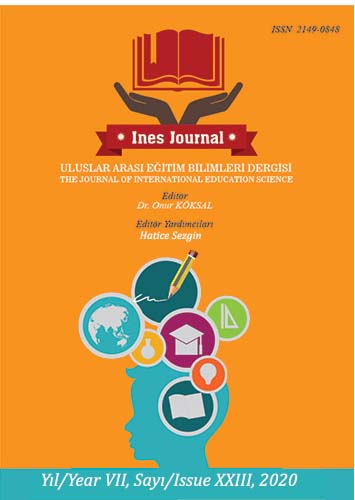Author :
Abstract
Diğer ülkelerde olduğu gibi ülkemizde de yabancı dil öğrenmenin önemine dair farkındalığın giderek daha da artması, yabancı ülkelere olan hareketliliğin daha fazla olması ve birçok sektörde yabancı dil bilen işgücüne duyulan gereksinimin her geçen yıl daha da fazla olması, yabancı dil öğretimini öncelikli bir durum haline getirmiştir. İlköğretimden yükseköğretim kurumlarına kadar yabancı dil derslerine devam eden öğrencilerin çoğu yeterli ve hedeflenen düzey ölçüsünde yabancı dil öğrenememektedir. Yabancı dil öğrenmenin, öğrencilerin dilin ana işlevi olan iletişim yeterliliğini kazanması, öğrenilenleri uygulaması, başka bir ifade ile öğrendikleri dil ile bir şeyler yapabilmeyi geliştirme süreci olduğu gerçeğinden yola çıkarsak, yabancı dil başarısındaki yetersizlik daha açık bir şekilde ortaya çıkmaktadır. Başlangıçta hevesli, katılımcı olan öğrencilerin yıllar geçtikte gramer odaklı ve yoğun olarak mekanik soruların çözümüne dayalı, yabancı dil olarak İngilizce öğretimini formüllerle çözülen bir matematik problemi gibi ele almaya başlamaları ile İngilizce derslerine olan ilgileri azalmakta ve başarı seviyeleri düşmektedir. Çalışmada İngilizce öğreniminde iletişimsel metodoloji, öğrenci merkezli aktivite, etkin bir İngilizce öğrenimi için detaylı bir biçimde tanıtılmış ve başarıyı arttırıcı faaliyetler üzerinde durulmuştur. Ayrıca iletişimsel metodoloji ve öğrenci merkezli aktiviteler olarak adlandırılan bu iki metodolojinin öğrenci motivasyonunu pozitif yönde arttırmak için kullanılabileceği ifade edilmiştir.
Keywords
Abstract
Considering the increase in the awareness of the significance of foreign language learning in our country as in the other countries, increased mobility to foreign countries and yearly increase in the need for a work force that knows a foreign language in many sectors, foreign language teaching has been prioritized all the more. Most of the students who attend foreign language lessons from primary schools to higher education institutions cannot learn a foreign language at a sufficient or desired satisfactory level. Foreign language learning is the acquisition of communicative competence, the main function of a language, and application of the things that have been learned, namely, developing the skill of doing things via the language learned. Considering these facts in mind, the inadequacy of foreign language success is more obvious. The students who are initially willing and participating deal with problems based on grammar and mechanical solutions over the years, and after they start to handle learning English as a foreign language like a mathematical problem that is solved by means of formulas, their interest in English lessons decreases and their level of success goes down respectively. In this study, Communicative methodology, Student-centered activities are introduced in detail for the purpose of English learning effectively and the activities that increase success are emphasized. Besides it was expressed that the two methodologies, which are the communicative methodology and student-centered activities, may be used to increase students’ motivation positively.
Keywords
- Akmajian, A., Demers, Richard A., Farmer, Ann K., and Harnish, Robert M. (2010). Linguistics: An Introduction to Language and Communication (6th ed.). Cambridge, MA, USA: MIT Press. Web. 2 February, 2019.
- Anderson, N. J. (2002). The role of metacognition in second language teaching and Learning. Retrieved, June 15, 2019 at https://www.ericdigests.org/2003-1/role.htm
- Bax, S. (2003). The end of CLT: a context approach to language teaching. English Language Teaching Journal, 57(3), 278-287.
- Canale, M. and Swain, M. (1980). Theoretical bases of communicative approaches to second Language teaching and testing. Applied Linguistics. 1., 1-47.
- Chomsky, N (1970). Current issues in Linguistic theory. Berlin and New York, Mouton de Gruyter.
- Dascal, M. (2003). Interpretation and Understanding. Philadelphia, PA, USA: John Benjamins Publishing Company.
- Farahian, M. (2015). Assessing EFL learners’ writing meta-cognitive awareness. Journal of Language and Linguistic Studies, 11 (2), 39-51.
- Fetzer, A., and Oishi, E. (2011). Context and Contexts Parts Meet Whole? Amsterdam. NLD: John Benjamins publishing company.
- Heine, B. (1997). Cognitive Foundation of Grammar. Oxford: Oxford University Press.
- Karasar, N. (2005). Bilimsel Araştırma Yöntemi. Ankara: Nobel Yayın Dağıtım
- Kraft, B. and Geluykens, R. (2007). Cross-cultural pragmatics and interlanguage English. Munich: Lincom Europa.
- Littlewood, W. (1981). Communicative language teaching. NewYork: Cambridge University Press.
- Magaldi, L. G. (2010). Metacognitive strategies based instruction to support learner autonomy in language learning. Revista canaria de estudios ingleses, 61, 73- 86.
- Martin, E. and Sanchez, G. (2001). Gente. Barcelona, Difusiyn.
- Nunan, D. (1988).The learner-centred curriculum. New York: Cambridge University Press
- Popova N.G. and Beavitt T.A. (2017). English as a means of scientific communication: linguistic imperialism or interlingua? Integration of Education. (21):54-70. DOI: 10.15507/19919468.086.021.201701.054-070
- Raikou, N., and Karalis, T. (2016). Adult education and higher education. A focus on transformative learning in universities. International Education & Research Journal, 2(4), 19-22.
- Raoofi, S., Chan, S. H., Mukundan, J., and Rashid, S. M. (2014). Metacognition and second/foreign language learning. English Language Teaching, 7(1), 36- 49.
- Sperber, D. and Wilson, D. (1995). Relevance: Communication and Cognition. Oxford: Blackwell.
- Tsuda, S. (2003). Attitudes toward English language learning in higher education in Japan: Raising awareness of the notion of global English. Intercultural Communication Studies, XII, 3.
- Vygotsky, L. S. (1962). Thought and Language. Cambridge: MIT Press.
- Willis, J. (1996). A framework for task-based learning. Essex, Longman.





